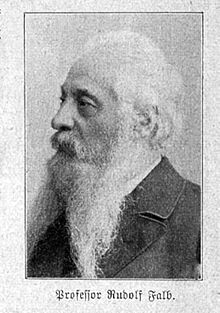Rudolf Falb
Rudolf Falb (born April 13, 1838 in Obdach in Styria , † September 29, 1903 in Schöneberg ) was an Austrian , since 1887 German researcher who dealt with earthquakes and meteorology .
Life
Falb attended 1850-1854 the convent school in St. Lambrecht's Abbey , studied in Graz University theology , became ordained priest and was then in the pastoral care worked. He later became a teacher and studied mathematics , physics and astronomy in Prague and geology in Vienna .
In 1872 Falb converted to Protestantism . He had founded the popular astronomical journal Sirius as early as 1868 and was its editor until 1877. Between 1877 and 1880 he traveled to South and North America for volcanological and archaeological studies .
In 1887 he moved to Leipzig and later to Berlin . Rudolf Falb died on September 29, 1903 in the then independent Prussian town of Schöneberg near Berlin.
On the basis of his scientific studies, he had developed a new earthquake theory, which, however, was rated very critically by experts; Falb blamed the constellation of the sun and moon for the movement of the liquid magna. But the opposition of the professional world did not prevent him from even developing a weather theory from which he derived predictions of the weather long months ahead. About this he published a meteorological calendar in which he designated certain days as "critical days of the first order". In later years he dealt with linguistics and constructed a connection between the ancient Mexican languages and Hebrew. In just a few years a following spread all over the world, who accepted his theories with great admiration, and who helped him out of trouble in an emergency with a fundraising campaign. He belonged to the Federation of Freemasons .
Together with Arthur Brehmer , who wrote under the pseudonym Charles Blunt, Falb wrote the science fiction The End of the World , in which the earth is destroyed by the collision with a comet .
Fonts
- Outlines of a theory of earthquakes and volcanic eruptions . Graz 1870
- Thoughts and Studies on Volcanism . Graz 1875
- Stars and people . Vienna 1882
- From the upheavals in space . Vienna 1881
- The land of the Inca in its meaning for the prehistory of language and writing . Leipzig 1883. Reprint of the original: Ravenna Presse im März Verlag, Herbstein 1984.
- Weather letters . Vienna 1883.
- The Masonic Secret and Spiritism. A scientific study. Vienna 1884.
- The weather and the moon . Vienna 1892.
- Critical days, deluge and ice age . Vienna 1895.
- with Charles Blunt (di Arthur Brehmer): The end of the world. Novel. Vienna 1899.
literature
- Falf Rudolf. In: Austrian Biographical Lexicon 1815–1950 (ÖBL). Volume 1, Verlag der Österreichischen Akademie der Wissenschaften, Vienna 1957, p. 283.
- Andreas W. Daum : Science popularization in the 19th century. Civil culture, scientific education and the German public, 1848–1914 . 2nd, supplementary edition, Oldenbourg, Munich 2002, ISBN 978-3-486-56551-5 .
Individual evidence
- ^ Andreas W. Daum: Science popularization in the 19th century. Civil culture, scientific education and the German public, 1848–1914 . Oldenbourg, Munich 2002, p. 173 f., 360, 405, 485 .
- ↑ Daum: Science popularization . S. 405 .
- ^ Gotthilf Weisstein: Rudolf Falb †. In: National-Zeitung, October 1, 1903, evening edition, p. 1
- ↑ Nessun SAPRA: Encyclopedia of German Science Fiction & Fantasy 1870-1918. Utopica, Oberhaid 2005, ISBN 3-938083-01-8 , p. 83.
Web links
- Literature by and about Rudolf Falb in the catalog of the German National Library
- Works by and about Rudolf Falb at Open Library
| personal data | |
|---|---|
| SURNAME | Falb, Rudolf |
| BRIEF DESCRIPTION | Austrian meteorologist, earthquake researcher |
| DATE OF BIRTH | April 13, 1838 |
| PLACE OF BIRTH | Shelter in Styria |
| DATE OF DEATH | September 29, 1903 |
| Place of death | Schöneberg |

